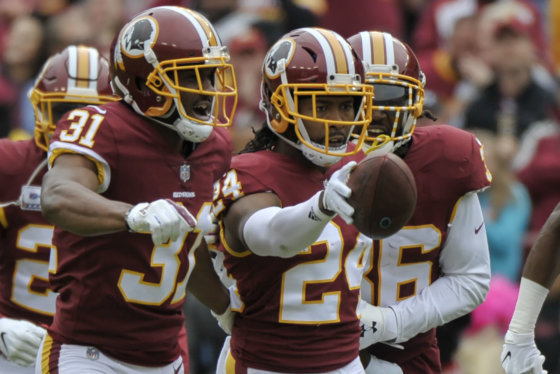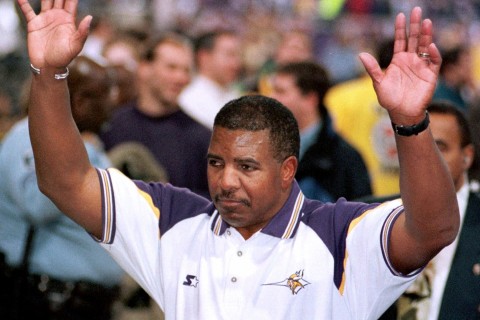WASHINGTON — You saw what happened Sunday night in New England.
The previously undefeated Kansas City Chiefs went into Foxborough and hung 40 points on the Patriots, the second-most points scored by the road team in the 17-year history of Gillette Stadium. It was the latest chapter in the six-week clinic Patrick Mahomes and the KC offense is putting on NFL defenses this season.
With Mahomes throwing touchdowns at a historic rate, the run game averaging 112 yards per game, and Andy Reid play-calling and scheming like he wants to test the need for a third digit on the scoreboard, few are talking about the coordinator of that balanced, prolific offense: Eric Bieniemy.
The Chiefs’ first-year OC also happens to be the only black offensive coordinator in the NFL, so the lack of buzz surrounding him bears monitoring. It’s not uncommon to hear the hyperbolic label “offensive genius” applied to the flavor-of-the-month quarterbacks coach with a hot QB, or coordinator with a high-powered offense. Sean Payton, Brian Billick, and Frank Reich have all carried that title with little pushback, and more recently Kyle Shanahan and Sean McVay. But we have yet to hear it applied to their black contemporaries like Jim Caldwell, Denny Green or Bieniemy, despite thriving in comparable situations.
With or without the corny label, Bieniemy deserves the attention. Not only is his offense averaging a whopping 35.8 points per game, but he’s streamlined an already successful unit and taken it to the next level with a less experienced quarterback than last year’s starter, Alex Smith. Bieniemy’s players love what they’re doing, and it’s a direct reflection of his work.
NFL Films apparently caught #Chiefs WR Tyreek Hill and the other receivers criticizing #Bears head coach Matt Nagy, who was their offensive coordinator last season.
They credit Eric Bieniemy for not forcing them to have to think so much and just play.
"It's much easier." pic.twitter.com/wkaNcNP8a8
— Dov Kleiman (@NFL_DovKleiman) September 20, 2018
Bieniemy’s ascension to a head job should be a given, considering he’s working for a head coach with fruitful branches on his coaching tree. Brad Childress, Doug Pederson, and Matt Nagy have all parlayed Reid apprenticeships into head coaching gigs, with Pederson returning to Reid’s old stomping grounds in Philly to win the Super Bowl Reid never could. Though Bieniemy doesn’t call plays — Reid has historically handled that himself, and does so currently — it shouldn’t preclude him from a promotion, because play-calling has long been an overrated aspect of what makes a coordinator a successful head coach, and Bieniemy is so integral to the Chiefs’ success in more meaningful avenues.
But history isn’t on Bieniemy’s side. He spent a total of 15 years coaching running backs in separate stints, and this season is his first in the NFL above that position. Historically, black running backs coaches struggle to ascend to the head coaching ranks, one of the many glass ceilings black assistants have bumped up against over the years. This story from The Denver Post last year spells out the challenges coaches like Bieniemy face in stunning detail, and it all directly ties into black players and coaches being steered away from the QB position — a big reason why the NFL has never had more than seven black head coaches at one time.
College football has it even worse. There are currently only seven black head coaches at Power 5 schools, and of them, Lovie Smith and Herm Edwards are the only ones without experience coaching QBs.
Like the NFL, major college football is even less diverse among assistants. In 2017, Michigan’s Pep Hamilton was one of only three black coaches tasked with quarterbacks or passing game coordinator. Whether college or pro, the go-to positions ripe for advancement are rarely granted to coaches of color.
Even when they are, some black coaches never get their shot. Terry Robiskie was the passing game coordinator for the 1999 Redskins, a team with an offense second only to the “Greatest Show on Turf” Rams that went on to win the Super Bowl that year. Robiskie was 36 when he got the ill-fated interim Redskins head job in 2000, and never got anything above another bad beat as an interim head coach in Cleveland.
Even the most die-hard football fans have never heard of David Culley. The longtime receivers coach was on Reid’s staff in Philadelphia when they advanced to Super Bowl XXXIX without Terrell Owens, and last year — at age 62 — finally got his chance to coach quarterbacks in Buffalo. But it comes at a point when he’s deemed too old to hire as a head coach, and with a team that can’t seem to avoid playing the awful Nathan Peterman.
But back to Bieniemy. Before this stint in Kansas City, he was best known for helping Adrian Peterson reach Hall-of-Fame heights. Peterson, who played his first four years under Bieniemy in Minnesota, is quoted as saying “he’ll be a good head coach one day.”
The 49-year-old Bieniemy should get his chance to prove it. There’s no reason for him to become a 60-something coach passed over for deserved promotions for a generation like Robiskie and Culley. It’s long past time for NFL owners and executives to cast aside stereotypes and bad hiring practices that continue to stand in the way of advancing proven black coaches.








